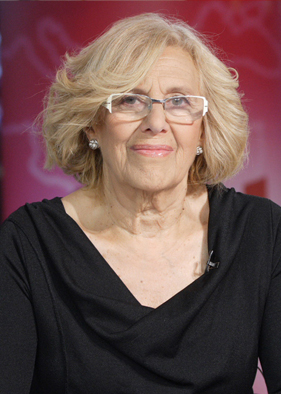May 2019, Year XI, no. 5
Manuela Carmena
The Dueña Mayor
"In 2050, in 30 years' time, two thirds of the world's population will live in cities. That’s why the importance of Local Governments is growing. And that’s the reason why I am committed, together with other worldwide colleagues, to making cities able to express their voice directly to major international bodies like the UN."
Telos: Every time someone talks about the direct election of the Prime Minister, people use the very evocative expression “Mayor of Italy”. This shows that Mayors have more power to impact on their citizens’ everyday life even than the Head of the Government. Does this apply also to Spain?
Manuela Carmena: Mayors lead a Local Government team and it is true that their decisions have a straight impact on the citizens. Perhaps even more visible than the decisions that the National government can take. The City Council is the closest administration to the citizens which many times call our door, because it is the closest to them. The National Government, the European Union or other agencies establish agendas against climate change, for example, but then the ones in charge for implementing these policies are City Councils. Local Governments are the most and best aware of the problems of their citizens and, at the same time, they can solve them more quickly and effectively. Cities are becoming more and more the chosen settlement of humans. In 2050, in 30 years' time, two thirds of the world's population will live in cities. That’s why the importance of Local Governments is growing. And that’s the reason why I am committed, together with other worldwide colleagues, to making cities able to express their voice directly to major international bodies like the UN.
The crisis of the political parties is probably the origin of the globally spread anti-political sentiment. However, this theory seems to be less true in the relationship between citizens and Mayors, since, in our view ideological factors carry less weight at the city level. Do you agree?
Mayors or Mayoresses around the world have, without a doubt, their own ideology, which evidently influences their way of ruling cities. I do not believe that Local Governments should be led by cold technocrats. However, it is true that many of the municipal decisions are related to daily problems of the cities, which often have little to do with ideological issues. I believe the main reason of the traditional political parties’ crisis is that they still have very rigid structures, are not flexible, and have not been able to adapt to the new times. Due to this I am standing for re-election and I will not do it through a platform of political parties, but through a platform of people linked by some similar goals, which, I think, will allows us to choose the best. We have to keep in mind that citizens, when they deposit their ballot, are choosing directly those who they want to be the head of the Local Government and their ministers.
You have been the Mayor of Madrid since 2015, and in your previous life you were a lawyer specialised in labour and a judge in first line against corruption. Elected in the list Ahora Madrid, supported by Podemos, you defend your “total independence” from the parties that back you at City Council. What are the major challenges you had to face as the Alcadesa of Madrid and how have you dealt with them?
Madrid main challenges are pollution; fight against climate change; streets cleaning; the imbalance between the districts that make up the city; proximity to citizens; transparency; fight against wastefulness and corruption... Over the course of my electoral mandate, we have considerably improved in making a closer and participatory Local Government. We have also worked in the fight against climate change. Regarding to climate change, we have advanced in in pedestrianising Madrid city centre and limiting road traffic to it. It's an issue of public health. I am sure that most of our citizens and the millions of tourists who visit us do appreciate these relevant decisions for our lives.
Re-election. You are running for a second mandate. Could you tell us the reasons for this choice?
I have decided to stand for the May 2019 election in order to finish many of the city improvement projects we have undertaken in the current electoral mandate. I am 75 years old and therefore I am not young. Four years ago, when I was elected mayor, I announced that there would only be one legislature and then I would return to my retirement status, which was already when I went to the polls. However, many friends and many anonymous citizens have finally convinced me to resubmit my candidacy. My intention is to win again and be Mayor for the second time. I must admit that a mandate of four years is too short accomplish many things in a city of more than three million citizens. There are other European capitals where the legislatures are longer. I presented myself to the elections through a new platform that I have not created myself: I am willing to be a candidate in a citizen platform, and not as head of a list of an existing party. My intention is to be able to form a team of men and women who will be the best to work for Madrid, which is already an imaginative, open, welcoming and enterprising city.
Marco Sonsini
Editorial
If Mayors Ruled the World is the title of a well-known book by Benjamin Barber about cities as global players. The subheading is perfect: dysfunctional nations, rising cities.The book focusses on the contrast between national and city governments: national governments that are more and more useless and city governments that instead do plenty of useful things for their citizens. But their work isn’t appreciated as it should be. This is precisely what Manuela Carmena, Alcadesa of Madrid, argues in the fourth interview in the series on mayors by PRIMOPIANOSCALAc, the monthly publication of Telos A&S. When in June 2017 Trump announced the US’s intention to pull out of the Paris Climate Agreement, in a New York Times editorial the mayors of Paris and Pittsburgh announced the emergence of “an unprecedented alliance […] which represents more than 7,400 cities around the world […] to honor and uphold the goals of the Paris Agreement” regardless of what nation they belonged to. No one takes cities into consideration when it comes to international relations; after all, cities are local governments, and their administrators are concerned with local issues, not global ones, huh! Yet today cities are becoming more and more influential: they have never been as influential since the era of the Italian Renaissance City-State. Carmena says that “in 2050, in 30 years'time, two thirds of the world's population will live in cities. That’s why the importance of local governments is growing. And that’s the reason why I am committed, together with other worldwide colleagues, to making cities able to express their voice directly to major international bodies like the UN.” Cities are no longer just places on the map, or the passive appendages of their national governments; they are independent, influential players in global politics. But formally, that’s not how things are, unfortunately.
Only nations can sit at the table of the UN, and a small role is conceded to some non-government organisations, which are sometimes consulted on issues in which they have particular expertise.
Cities do not have the same privilege, though; and they are never mentioned in the UN Charter. Carmena' struggle will not be easy. But she will not give up easily either; and she has proven this throughout her entire career. A lawyer-activist, politician, judge against corruption and militant defender of human rights, she was even awarded the National Human Rights Award in 1986 by the APDHE, the Spanish human rights association established in 1976. Carmena’s distinguishing trait is her passion and dedication to what she believes is the right thing to do, and this is indeed why the image chosen for the cover of her interview is an ebullient, fiery-red flamenco skirt. Does choosing flamenco to identify a Spanish city seem too obvious a choice? To us, it doesn’t. Flamenco is a folk dance born in the town squares – the hearts of city life – and starts almost unexpectedly from the spark ignited when the gaze of the musicians meets that of the woman, who often dances alone. This same spark is ignited in the dialogue between Mayor Carmena and her citizens, whom in Spanish she calls los vecinos, her neighbours. This spark is what has guided her government action to deal with the challenges Madrid has put on her plate: pollution, from the differences between the city districts to street cleaning, the struggle against wastefulness and corruption, citizens’ demand for transparency. Along with the cover image, there is an aphorism by Spanish writer and cartoonist Antonio Mingote about the capital of Spain: “Madrid is like a woman who isn’t very attractive, but who you can’t live without.” Who knows whether Carmena agrees?
Mariella Palazzolo

Manuela Carmena is the Mayor of Madrid since 2015. Lawyer and judge, she was a member of the General Council of the Judiciary. Manuela will run for re-election in the 2019 municipal election, but has stated that she will retire should she not be re-elected as Mayor. In November 2018, the political platform for Más Madrid was unveiled, with Carmena at its centre.
After graduating in law in 1965 from the University of Valencia, she became a legal representative of workers and detainees during the Francoist State and was co-founder of the Labour Law firm where the 1977 Massacre of Atocha took place.
Carmena, joined the Communist Party of Spain (PCE) in 1965, and she ran as a candidate in the PCE list for the 1977 general election in the constituency of Madrid. She had left the party by 1981.
As a judge she began an almost solitary fight to prevent corruption in existing courts. In 1986 she received the National Human Rights Award, Premio Nacional Derechos Humanos.
She was a founding member of the progressive association Judges for Democracy. Judge of Penitentiary Vigilance and head of the Penitentiary Vigilance Court No. 1 of Madrid, she was elected senior judge of Madrid in 1993.
After retiring from the judiciary in 2010, Carmena moved on to become a member of the Patronato de la Fundación Alternativas, a think tank with ties to the Spanish Socialist Workers' Party (PSOE), and whose members included the former Socialist prime ministers Felipe González and José Luis Rodríguez Zapatero.
Married with the architect Eduardo Leira, they have had two children: Eva and Manuel.
A tidbits. She is a fan of the city of Naples. In an interview of she said: ‘If you have come to 73 without ever been to Naples, there is something wrong with your life. I’m always available to go to Naples, it's a city I love. So rich in charm and mystery, it has an indissoluble bond with Spain.’
Marco Sonsini







SocialTelos